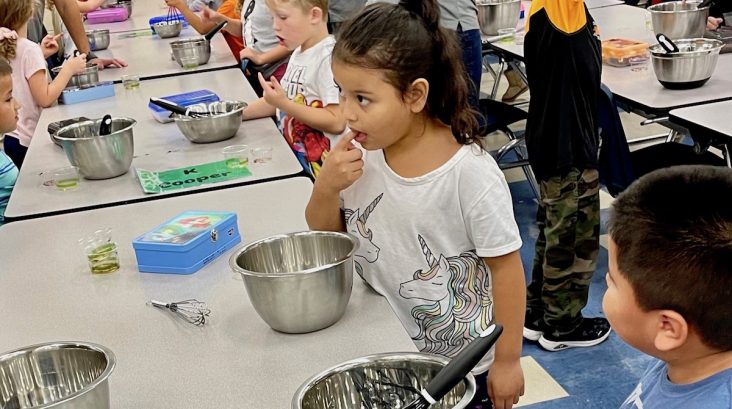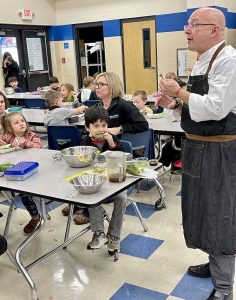Salads and salad dressing part of the day at Fairview Elementary in Fort Smith
by October 28, 2021 6:24 pm 1,010 views

Kindergartners at Fairview Elementary School in Fort Smith work on making salad from greens grown in school gardens.
Sweet – and sour – memories were made and lessons learned with kindergarten students at Fairview Elementary School in Fort Smith when they celebrated their first harvest Thursday (Oct. 28). The kindergartners created salads with greens harvested from their classroom gardens and learned about emulsion by creating salad dressing.
The event was the first public culinary arts and science activity in the pilot program collaboration with Fort Smith Public School (FSPS), Arkansas Colleges of Health Education (ACHE) and Brightwater, a Center for Food Science.
The program is one of the many supported by a $32.3 million anonymous donation to the Arkansas Colleges of Health Education announced June 22 that will support a holistic approach to health and wellness and include partnerships with public schools, art centers, a community garden, and Brightwater, an academic department of NorthWest Arkansas Community College (NWACC) in Bentonville.
Based on the kindergarten standards used within the FSPS system, the program uses a cohesive model for food education, integrating food into traditional subjects within the STEAM model, according to a presentation to the FSPS school board in May. The goal is to build students’ knowledge and experiences of and with food through lessons that teachers are already using.
ACHE provided all the material for the program that began with students in three Fort Smith elementary schools – Fairview, Cook and Ballman – planting seeds for a tower garden in their classrooms. The “salad” seeds included basil, bibb lettuce, red leaf lettuce, red chard, arugula and kale.

Thursday’s program included a science experiment that consisted of making a vinaigrette to dress their salads. In doing so, students learned about emulsion and the heaviness of oil and vinegar, said Dr. Elizabeth McClain, chief wellness officer at ACHE. Students also tasted their harvest with and without the salad dressing they created. And while some didn’t care for the taste, McClain said exposing them to the foods repeatedly as they mature can lead them to appreciate and like the foods.
“Our goal is to focus on prevention and on healthy lifestyles and access to nutritious food,” McClain said.
The education focus is to move the needle on health literacy and nutrition literacy.
“As the children get older and start to make these choices, they will understand healthy habits and healthy choices,” McClain said. “We want to engage the families and really start to make changes, albeit a small change, with the community and cultivate a culture of health.”
FSPS goals are that students will learn education standards “while learning about food and nutrition and how it connects them to themselves, the communities and the world while planting the seed for living a healthy lifestyle and reducing the need for medical interventions,” Deputy Superintendent Marty Mahan said in a presentation to the school board May 10.
The program will grow throughout the year and will include many more aspects of healthy food preparation, McClain said. Kyle Parker, president and CEO of ACHE, said the institute will conduct research throughout the program, which includes 220 FSPS kindergarten students.
“We do the research. That research is published. Others will read about how this works, and it can spread to other school districts and reach more communities,” Parker said.
